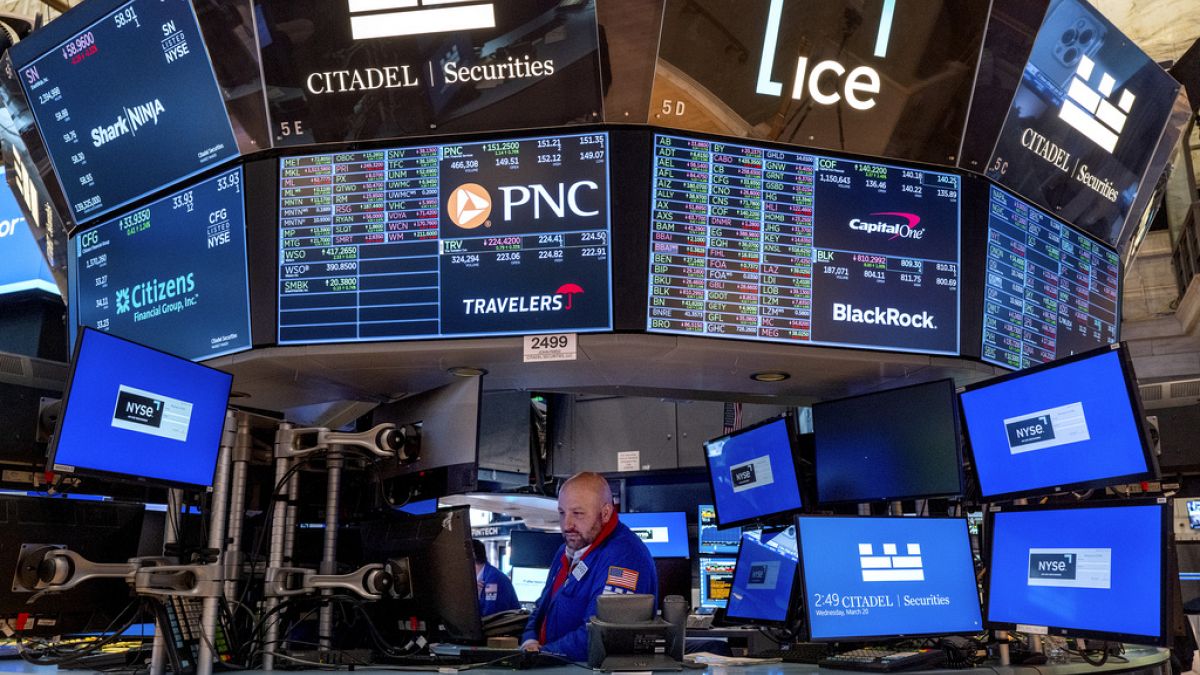The Federal Reserve's interest rate hikes have caused Treasury yields and mortgage rates to rise, contributing to a housing affordability crisis, and analyst Bruce Kamich predicts that rates could continue to climb, potentially reaching levels higher than last year's peak.

The article provides a list of 15 countries with the largest budget deficit as a percentage of GDP, with China, Brazil, and Saint Vincent and the Grenadines ranking among the top.

New vehicle sales in the U.S. rose nearly 5% in the first quarter of the year, but electric vehicle sales growth slowed due to concerns about limited range and charging infrastructure. Automakers were forced to reduce prices and increase discounts to boost sales, with the average sales price declining. Skeptical mainstream buyers and high interest rates also impacted sales, while more affordable vehicles sold faster than expensive ones. Some automakers reported declines in sales, while others saw increases. Tesla's global sales were down due to factory changes and shipping delays.
The United States is facing an unsustainable path of national debt, with simulations suggesting that borrowing is on a concerning trajectory due to an aging population, rising healthcare costs, and increasing interest rates. The national debt is projected to reach $54 trillion in the next decade, with interest payments expected to triple by 2032 and surge to $5.4 trillion by 2053, posing a risk to the country's economic standing.

Federal Reserve Bank of Cleveland President Loretta Mester expects the central bank to cut rates this year, with the possibility of easing beginning in June if inflation data meets her forecast, cautioning against premature rate cuts and emphasizing the need for sufficient evidence of sustainable inflation before reducing the funds rate.

The long-feared recession may be delayed until 2025, as US factory activity expanded in March, indicating economic resilience, according to JPMorgan.
Hedge fund billionaire Ken Griffin warns of dire consequences for future generations if the US government continues to increase its debt, criticizing the current borrowing practices in light of low unemployment rates. Griffin joins other financial leaders, such as JPMorgan CEO Jamie Dimon, in sounding the alarm about the growing debt burden and the need for action.

Federal Reserve Bank of Cleveland President Loretta Mester wants more evidence of lower inflation before cutting interest rates, but believes that recent figures align with her expectation for slower progress on price growth. She still sees three rate cuts as likely appropriate this year, but it is a "close call" on whether fewer will be needed. Mester raised her long-term federal funds rate forecast to 3% from 2.5%.

A report by Yahoo Finance reveals that among the 30 countries with the highest debt-to-GDP ratios in 2024, six African countries made the list, with Sudan having the highest debt burden in Africa at 238.8% of GDP.
Despite a slight increase in layoffs in February, the US job market remains strong with high levels of job openings and a steady drop in unemployment rates.

If the Federal Reserve cannot cut interest rates in June due to high inflation readings, it may delay easing until March 2025, according to Bank of America, although the next PCE readings will ultimately determine the number of rate cuts this year.
Job openings in the western part of the U.S. increased, while other regions reported stalled openings, indicating a gradually expanding labor market, according to data from the U.S. Bureau of Labor Statistics.

Former Federal Reserve Bank of Atlanta President Dennis Lockhart believes that the Fed is unlikely to cut interest rates in their upcoming meetings in April and May, and it may even be pushed back beyond June, as long as the economy continues to tolerate the current level of interest rates and disinflationary progress remains slow.
The World Bank is set to approve $1.2 billion of budget financing for Kenya, slightly less than anticipated, in an effort to reduce the country's reliance on commercial debt.

UK factories saw a jump in domestic orders, ending almost two years of contraction, indicating that the manufacturing sector is recovering from the previous year's downturn; however, export orders continue to decline due to global difficulties.

Connecticut ranks among the most challenging states to be middle class, with one of the highest income requirements, due to financial insecurity, higher debt loads, and a shrinking middle-class income.

The February Job Openings and Labor Turnover Survey (JOLTS) data shows a higher-than-expected number of job openings, but overall there is little change in labor market conditions, leading to "no impact" on the Federal Reserve's current outlook, according to BMO Capital Markets Senior Economist Jessica Lee. She believes that the Fed's decision on rate cuts depends on the overall data and their communication rather than just one report.
Stocks and bonds dropped globally as strong economic data and a rally in commodities raised speculation that major central banks will maintain higher interest rates for a longer period.

New orders for U.S.-manufactured goods increased by 1.4% in February, driven by demand for machinery and commercial aircraft, signaling a recovery in manufacturing after a period of struggle.

Fitch Ratings affirms Israel's credit rating at A+, but changes the outlook to negative due to uncertainties surrounding the fiscal trajectory and the duration and intensity of the Israel-Hamas war.

U.S. job openings remain at historically high levels in February, signaling a strong job market, while layoffs increase and the number of Americans quitting their jobs rises modestly; the combination of easing inflation and sturdy job growth raises hopes of a "soft landing" for the economy.

The head of research at Fundstrat predicts that the Fed will cut rates in June due to a slowdown in inflation, which is good news for stocks.
The Japanese government plans to welcome 820,000 foreign workers in the transportation and logistics sectors over the next five years to address critical labor shortages in the country, issuing new visa types that allow multiple renewals and the opportunity to bring family members.

India's rapidly growing economy is struggling to create enough jobs for the millions of young Indians entering the labor market, resulting in high youth unemployment and a massive mismatch of skills and expectations, particularly among college graduates and women, presenting a significant challenge for Prime Minister Narendra Modi's government ahead of the general election.

House price growth in the UK was subdued in March due to higher mortgage rates, impacting affordability, according to the Nationwide. While affordability pressures on buyers are weighing down on the housing market and price growth, there has been stronger growth in Northern Ireland and the North of England due to lower house prices and higher demand. The annual house price increase of 1.6% in March was the fastest rise since December 2022, but a smaller increase than expected. However, income rises are gradually making houses more affordable, and interest rate cuts are predicted later this year.

Labour is criticized for lacking a clear policy agenda and committing to similar fiscal rules as the current government, leaving doubts about their ability to bring about meaningful change if elected.

Germany's far-right party, Alternative for Germany (AfD), heavily relies on wealthy elderly donors, including individuals like Hartmut Issmer, the party's biggest known donor, to fund its activities, as it receives around half of its annual income from private sources rather than state financing. These donors, largely over the age of 65 and prosperous, have the financial means to contribute to the party and often hold conservative views on topics such as migration, climate change, and Russia. However, as the party faces increased scrutiny and potential legal consequences, its ability to attract new donors and replace its aging base is uncertain.

Germany's inflation dropped to 2.2% in March, the lowest figure since April 2021, due to decreased energy prices, leading to speculation that the European Central Bank may cut interest rates.

Former President Donald Trump has posted a $175 million bond in his New York civil fraud case to appeal the judgment and prevent asset seizure, with the bond underwritten by billionaire Don Hankey, who is believed to be the largest shareholder in Axos Bank, the financial institution that refinanced Trump's loans on Trump Tower and Doral.

### Summary The Washington Post reports on the tragic death of an Australian aid worker in the Gaza Strip, a surge in Buffalo Sabres' victory over the Washington Capitals, a school shooting in Finland, a deadly dog attack in Edmonton, a political clash over carbon pricing in Canada, the financial struggles of Donald Trump's social media firm, viewing options for the total solar eclipse, the tight housing market in Calgary due to interprovincial migration, and McDonald's Canada launching a new menu of customer hacks.

The IMF mission team has arrived in Ghana to conduct a second review of Ghana's IMF-supported program, which will determine whether the country will receive the third installment of the $3 billion bailout request.

Despite the tragic collapse of the Francis Scott Key Bridge in Baltimore, experts predict that the local economy will likely withstand the effects due to factors such as low unemployment and low inflation. The region's job market is diverse, and the port will eventually reopen, providing opportunities for workers to find new employment. Additionally, the cost of living in Baltimore is cheaper than elsewhere in the state and the US as a whole, making it an attractive city to call home. The housing market in Baltimore is relatively decent, with housing affordability better than the national average.

Citadel CEO Ken Griffin warns that the growing national debt in the US could burden future generations, urging the government to address the issue; other prominent CEOs and financial experts also express concerns about the nation's debt-to-GDP ratio and its potential impact on economic growth.

Irish inflation has dropped below the European Central Bank's target rate of 2 percent for the first time in almost three years, primarily influenced by falling energy prices, which declined by 3.1 percent in March.
:quality(70)/cloudfront-eu-central-1.images.arcpublishing.com/irishtimes/5VC4RA66K4RPU5HCRCYT32D5QE.jpg)
The retirement crisis in the United States is worsening, as the number of workers over the age of 75 is projected to double in the next decade, with disappearing pension plans, a potential Social Security shortfall, and inadequate retirement savings creating financial hardships for many Americans.

The Central Bank of Russia is maintaining a 16% interest rate to control inflation caused by a thriving economy fueled by consumer activity and wage gains, although potential risks lie ahead due to sanctions and the geopolitical situation.
Mergers and acquisitions in Africa saw a decline in 2023, but East Africa experienced increased activity, with Kenya and Nigeria recording the most deals; the top 10 African countries with the most expensive deals included Botswana, Zimbabwe, and Egypt.
The US labor market has shown signs of cracks with an increase in state-level unemployment rates, triggering discussions about whether a recession is looming, but economists suggest that the rise in unemployment may be due to an influx of immigrants searching for jobs rather than a sign of economic weakness.

The EU's accommodation and food service sector, comprising 1.9 million enterprises, employed 9.9 million people and contributed 6.3% of the persons employed and 2.2% of value added in the business economy in 2021, with Greece having the highest contribution to value added and Greece, Cyprus, and Spain having the highest contribution to employment.

The focus this week will be on crucial economic indicators in both the EU and the US, with attention on inflation data in the EU and job figures in the US, as these metrics provide insights into economic health and shape market sentiment.

Euro zone manufacturing activity contracted at a steeper pace in March, but there was an uptick in optimism, as demand continued to fall and new orders declined for a 23rd month.

The European Union's Innovation Fund, a €40 billion investment vehicle aimed at achieving zero-carbon economy, faces early challenges as manufacturing and hydrogen projects struggle to get off the ground, posing concerns for the bloc's climate targets.

Argentina's president, Javier Milei, has faced challenges implementing his promised economic reforms as poverty reaches a 20-year high, despite his efforts to cut public spending and devalue the peso.
:quality(70)/cloudfront-eu-central-1.images.arcpublishing.com/irishtimes/ZESR7GKZ3IMP4CKPMTNX5G3AIY.jpg)
France's ambitious plan to transform its economy under President Macron has failed, with the country facing a significant budget deficit in 2023 and little economic growth to show for the reforms implemented. The high levels of state spending and increasing debt raise concerns about France's ability to pay back its loans, potentially leading to a financial crisis with consequences for the eurozone.

Australia's economy is finely balanced between the risks of high inflation and subdued spending, leading the Reserve Bank to keep interest rates steady and maintain a cautious outlook on inflation and household spending.

The decline in iron ore prices in China reflects a shift in the country's commodities market towards the new economy and renewable energy, as the government focuses on sectors other than real estate for economic growth.

India's manufacturing industry experienced strong growth in March, with the sector expanding at the fastest rate in 16 years and hiring increasing at the strongest pace in six months, driven by accelerating demand. This is expected to support Prime Minister Narendra Modi's government, which has focused on manufacturing to boost the economy ahead of the general election.

UK shop prices have experienced the lowest level of inflation in over two years, as retailers reduced prices on Easter treats and non-food items, amid a consumer spending slowdown in the cost of living crisis.

President Joe Biden's rhetoric on the economy is not resonating with the public, as rising inflation and the high prices of food and housing continue to make people feel bad.

Rising temperatures and extreme weather events are projected to increase food prices and inflation within the next decade, according to a study by climate scientist Max Kotz and the European Central Bank.
